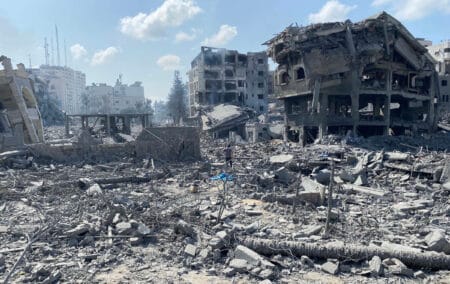BDS (Boycott, Divestment, Sanctions) and their MNR cohorts will undoubtedly be in an uproar over President Trump’s bold and unapologetic actions—whether it’s the hard-line tariffs proposed on Mexico, Canada, and China or the strategic take-over of the Panama Canal, Greenland, and Gaza.
Their predictable outcry of ‘American hegemony’ and ‘imperialism’ is nothing more than a tired script, a knee-jerk condemnation of the U.S., Israel, and the West. Most certainly, the Democrats and other leftist voices in the West will eagerly join in that condemnation, reinforcing their habitual narrative of Western guilt. But the reality remains: power shapes history, and Trump’s America is unapologetically at the helm.
Trump’s Mideast envoy Steve Witkoff states, “Palestinians need not be tied to the land where they now live in order to have a better life,” as the Trump administration rallies around the President’s idea to relocate Palestinians out of Gaza.
While Sudan is facing an unfolding humanitarian catastrophe, being the world’s worst humanitarian crisis, Egypt has opened its borders to more than 500,000 Sudanese refugees. Being a signatory to the 1951 Refugee Convention, its 1967 Protocol, and the 1969 OAU Refugee Convention, it is committed to protecting those fleeing conflict, upholding non-refoulement, and providing asylum. The OAU Convention broadens this protection to include those escaping violence and war.
Egypt has upheld its commitment to sheltering those fleeing Sudan, just as it did during the Syrian civil war, when it welcomed hundreds of thousands of displaced Arabs seeking safety. However, Egypt has dismissed outright the Trump suggestion that Palestinians be relocated to its territory, firmly rejecting any plan that would see Gaza’s population housed in Egypt. Cairo has made it clear that it will not allow the displacement of Palestinians, despite its history of offering refuge to other victims of war. Egypt refuses to facilitate any attempt to depopulate Gaza under the guise of humanitarian relief, notwithstanding that both places share a common language, religion and culture.
Given the crisis in Gaza—where the population has endured war and economic collapse—the argument for relocation is not only practical but humane. The territory is densely populated, with almost two million people crammed into an area with limited resources, deteriorating infrastructure, little prospect for economic self-sufficiency, and an uncertain political future.
Gaza shares a border with Egypt, an inconvenient truth often brushed aside by the media. This border provides direct access to the Sinai Peninsula, one of the most sparsely populated regions in the entire Middle East. This vast expanse of land, larger than South Africa’s Mpumalanga province, inhabited by nearly 5 million people, stands in stark contrast to Sinai’s meagre population of less than 600,000 souls. Tragically, this lifeline remains tightly sealed off to those wanting to leave Gaza. It seems that Egypt lacks the will to extend a helping hand to their Arab brethren.
History provides ample precedent for large-scale relocations to improve the lives of displaced populations. Some major examples of mass population resettlements over the past 50 years:
Syrian Refugee Crisis (2011–Present):
Over 6.8 million Syrians have fled their country due to civil war.
Countries like Turkey, Germany, Lebanon, Jordan, and Egypt have taken in large numbers of refugees.
Ukrainian Refugee Crisis (2022–Present)
Russia’s invasion of Ukraine led to the displacement of over six million Ukrainians across Europe. Poland, Germany, and other EU nations have provided asylum and support.
Rohingya Crisis (2017–Present)
More than 1 million Rohingya Muslims fled Myanmar due to military persecution.
Sudanese Civil War & South Sudan Independence (1983–2011, 2023–Present)
Millions of Sudanese and South Sudanese were displaced to neighbouring countries due to civil war.
Iraqi Refugee Crisis (2003–2011, ISIS Insurgency 2014–2017)
After the U.S. invasion and later ISIS violence, over four million Iraqis were displaced. Many resettled in Jordan, Syria, the U.S., and Europe.
Bosnian War & Kosovo Conflict (1992–1999)
The Bosnian War (1992–1995) and Kosovo War (1998–1999) led to mass displacement. Over two million Bosnians and one million Kosovars sought refuge in Germany, the U.S., and other European nations.
Vietnamese “Boat People” Crisis (1975–1980s)
After the Vietnam War, 1.5 million Vietnamese fled the country, often by sea, and resettled in the U.S., Canada, Australia, and France.
Ethiopian & Eritrean Conflicts (1974–1991, 1998–2000, 2020–Present)
Decades of war and famine displaced many millions from this region.
These cases highlight how forced migrations, often due to war and persecution, have led to mass resettlements across the world. Countries across the world have embraced displaced communities, from post-World War II migrations to modern refugee programmes. Why should the people of Gaza not be afforded the same opportunity for a fresh start elsewhere?
The idea that Palestinians must remain in Gaza, despite its devastation, ignores the reality that many of its residents would likely prefer safety, economic security, and a better quality of life over an uncertain future. Those who argue against relocation often do so on ideological grounds rather than out of genuine concern for the well-being of Gazans themselves. Furthermore, Egypt (and other Arab nations) possess vast, underpopulated territories with the economic potential to absorb and integrate displaced Palestinians, providing them with a future beyond the constraints of Gaza’s war-torn landscape.
If other countries have provided sanctuary to millions of refugees, why not extend the same humanitarian lifeline to Palestinians? Rather than insisting that Gaza’s population should remain trapped in a cycle of suffering, the international community should recognize relocation as a viable, long-term solution to a humanitarian disaster that shows no signs of ending.
The views of the writer are not necessarily the views of the Daily Friend or the IRR.
If you like what you have just read, support the Daily Friend .

